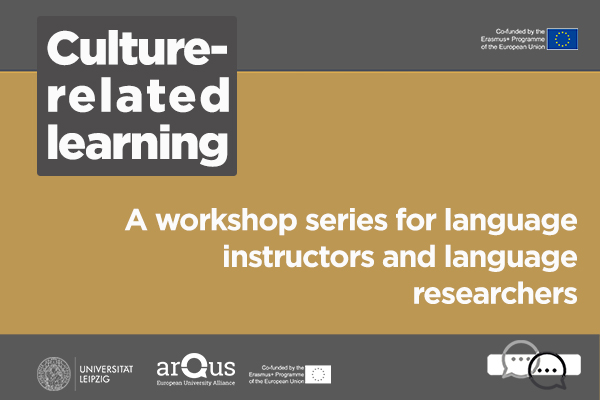
“Culture-related learning” workshop series for Arqus language instructors and researchers

Culture-related learning plays a central role in learning and experiencing languages. In this workshop series, existing concepts and theories of culture-related learning will be critically examined, current research approaches discussed and possibilities to put these into practice in the foreign language classroom presented.
This workshop series was planned in close coordination with Professor Claus Altmayer from the Herder Institute at Leipzig University. Professor Altmayer researches and teaches in the areas of German as a foreign and second language and cultural studies.
Detailed Program & Registration is described below.
Workshop format:
Online.
Registration:
Please register at least 6 days before the start of the respective workshop. You will then be informed with sufficient advance notice whether we can confirm a place and you will also receive all further information, e.g. Zoom link, via e-Mail.
Fee:
The workshop is free of charge for staff members and students of the Arqus Alliance partner universities.
Target group:
Staff, (post)graduate students.
Contact:
For any enquiries, please contact Jupp Möhring.
Date and time (CET):
- Cultural learning in the foreign language classroom: A Question of Identities and Taste? Suzana Vezjak (University of Economics in Bratislava). 23.11.2021, 15:00 – 18: 00.
- Learning Facts or Exploring Discourses – Can Culture Be Taught? Björn Kasper (University of Leeds). 26.11.2021, 14:00 – 17:00.
- Lernen durch Irritation oder Wie wird Bedeutung ausgehandelt? Mathias Neitzke (Study & Training – Privates Studienkolleg Leipzig). 02.12.2021, 16:00 – 19:00.
- (Diskursive) Landeskunde heute — zwischen ‚Leitkultur‘, Gedächtnistheater und anderen Narrativen der Dominanzgesellschaft. Paula Linke (Academy of Fine Arts, Leipzig). 20.12.2021, 17:00 – 20:00.
Detailed Program & Registration:
- Workshop 1. Cultural learning in the foreign language classroom: A Question of Identities and Taste? Suzana Vezjak (University of Economics in Bratislava). 23.11.2021, 15:00 – 18: 00 CET.
The metaphor of the menu serves as the vehicle for the order of the workshop content:
Starter: We will start with a critical examination of the ‘intercultural’ paradigm of ‘Landeskunde’ in foreign language learning.
Side Dish(es): We will discuss, why cultural learning in the foreign language classroom should deal with ‘cultural patterns of interpretation’ (‘kulturelle Deutungsmuster’) and the use of language in discourses.
Main Course: The concept of foreign language discourse awareness will be presented as a target construct of foreign language learning. We will look at examples from an alimentary online discourse and ask ourselves, how and with what goal we can use them in the classroom.
Dessert: We will end up with a discussion about the meaningfulness of such an approach and the possibilities of its integration in your classrooms.
The subject of language teaching itself, the language and the active use (of the language) are changing comprehensively through globalization, digitalization and mediatization and will continue to change. In the age of media diversity and heterogeneous learning interests, it is advocated that new forms of interactive computer-mediated communication should be taken into account, as they first expand the possibilities of direct exchange in an authentic real context with other learners and speakers and secondly open up new fields of linguistic registers and modes of communication which can lead to action-related and culturally and discourse-sensitive German as a foreign language/ German as second language lessons.
By closely interlinking the micro and macro levels, thus the interpersonal and group discussion in forums in alimentary online discourse supra-individual positions, the interdiscursive connections, stylization practices, collective use of language, etc. will became visible. This positions and practices, however, have (only) a local or temporary validity. By dealing with such temporarily valid patterns in their socio-symbolic charge, learners can be encouraged to deal with rules, norms and conventions in a context-sensitive, reflective, but also flexible, ironic and possibly even playful way.
Language of instruction: English.
Deadline: 19 November 2021 (13:00 CET).
- Workshop 2. Learning Facts or Exploring Discourses – Can Culture Be Taught? Björn Kasper (University of Leeds). 26.11.2021, 14:00 – 17:00 CET.
How do we empower students to be capable not only of engaging but actively participating in the cultural surrounding of the target language? After presenting and discussing some theoretical groundwork, basic concepts and major developments in the field of Cultural Learning in the foreign language classroom based on current research approaches in the field of Cultural Studies, this workshop intends to provide a hands-on interactive learning experience. The objective is to identify and trace steps of Cultural Learning by using some didacticised material as well as authentic material from everyday media and pop culture. Finally, theory shall be put into practice by designing and reflecting on an own basic lesson plan to take away.
Language of instruction: English.
Deadline: 19 November 2021.
- Workshop 3. Lernen durch Irritation oder Wie wird Bedeutung ausgehandelt? Mathias Neitzke (Study & Training – Privates Studienkolleg Leipzig). 02.12.2021, 16:00 – 19:00 CET.
Lernen gibt es so lang wie die Menschheit, vielleicht sogar länger. Seitdem stellt sich die Frage: Wie lernen wir? Und seit neuerem steht dabei im Vordergrund: Wie wird Bedeutung ausgehandelt?
Beide Fragen sind nicht leicht zu beantworten. Deshalb wird sich in dem Workshop aus unterschiedlichen Perspektiven an diese angenähert, um sie im Kern zu untersuchen. Die Teilnehmenden sind herzlich eingeladen, sich hierbei aktiv einzubringen. Die Annäherung erfolgt über die Grundkonzepte des Deutungsmusters, des reflexiven und expansiven sowie kulturbezogenen Lernens und schlägt die Brücke von theoretischen Grundlagen zu der Anwendung in der Praxis des DaF-Unterrichts unter Zuhilfenahme einiger empirischer Befunde.
Language of instruction: German.
Deadline: 25 November 2021.
- Workshop 4. (Diskursive) Landeskunde heute — zwischen ‚Leitkultur‘, Gedächtnistheater und anderen Narrativen der Dominanzgesellschaft. Paula Linke (Academy of Fine Arts, Leipzig). 20.12.2021, 17:00 – 20:00 CET.
What is it even good for? Was sollte ‘diskursive Landeskunde’ im heutigen Kontext des Faches DaF*DaZ in einer (post)migrantischen, (post)kolonialen und globalisierten Gesellschaft leisten können?
Am Beispiel des Diskurses um die diesjährige Frankfurter Buchmesse werden wir befragen, inwieweit solche Ereignisse Anlass bieten können, um Machtverhältnisse und ein Zusammenwirken gesellschaftlicher Strukturen im Unterricht zu thematisieren.
Language of instruction: German.
No registration deadline.
Please note: In order to ensure the quality of the session and for the benefit of the participants, we limit the number of participants for each workshop. There is max. four workshop places per partner university and per workshop, and those will be allocated on a first-come, first-served basis. If there are less than three/four registrations from one university, the remaining places will be allocated in list order regardless of affiliation to a partner university.
This activity is organized within the framework of Action Line 4, a Multilingual and multicultural university (sub-line 4.5), led by Leipzig University. These workshops target academic and administrative staff at partner universities and focus on specific topics ranging from working and teaching through the medium of English, intercultural awareness in the classroom and outside, to inclusive language.